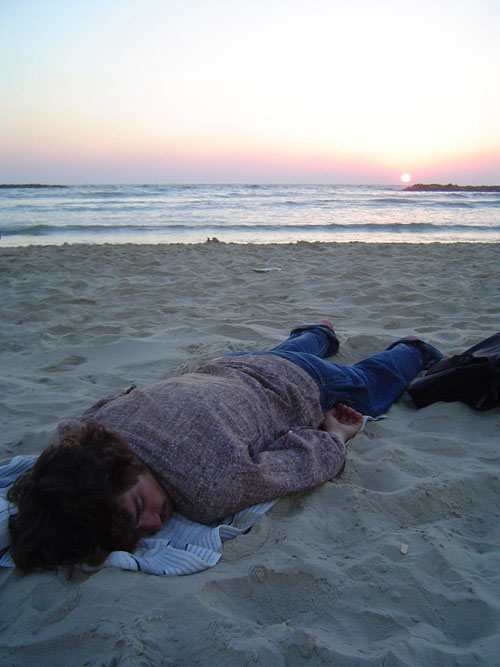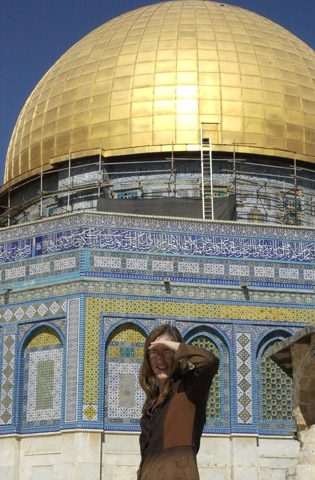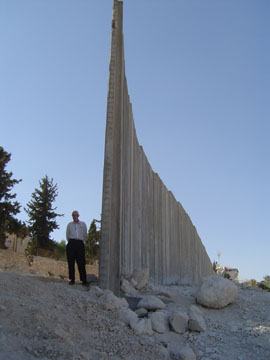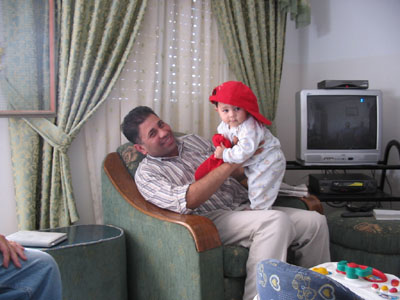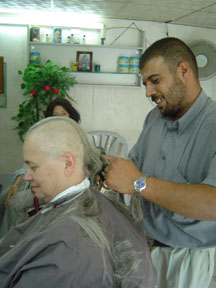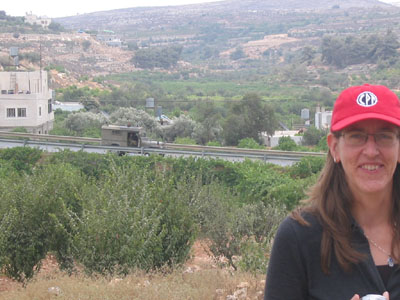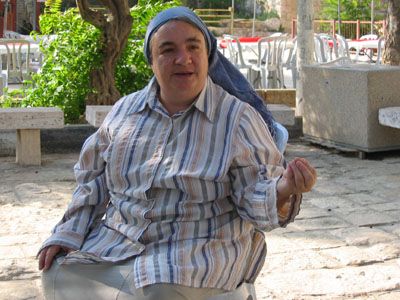An old friend wrote me recently to share some thoughts and a book review by Ethan Bronner on the book "The Missing Peace: The Inside Story of the Fight for Middle East Peace" by Dennis Ross, the memoirs of "the central figure of American Middle East peace policies." Ross worked under the 1st Bush and under Clinton and was intimately involved in the 8 month long peace negotiations between the Palestinians and the Israelis that started with the July 2000 Camp David Summit.
My friend also encouraged me to seek out ordinary Israelis to get a more balanced view of the complex struggle going on in Israel/Palestine. I really did agree with all of his comments and I found the book review very interesting. I do know that most Israelis just want peace (My team mate, Rebecca cynically cracked, "Yeah, all they want is peace and quiet"). We’ve been told that most of the settlers in the West Bank are economic settlers … that is, they were enticed here with low-interest loans, freebies and perks (when I heard about some of the great deals they get it almost made me want to convert!). Many would be happy to leave if the government would assist them to do so.
I have to admit that I do get a skewed image of Israelis by just seeing the Hebron settlers and the soldiers. But that doesn’t mean I should disregard the situation I’m in to search out a balance that simply doesn’t exist here in any ordinary sense. Its the work that CPT does … putting themselves into a conflict zone where the situation has become so polarized as to appear outlandish to normal, peace-lovin’ folks. There is no way, in the short time I’m here that I can get a complete picture of what is going on. It would take many trips, perhaps over many years, to fully grasp it. In the West Bank you are just overwhelmed with all the bizarre things that are going on … issues that the Israelis I have met (mostly working in the anti-Occupation camp) have told me that Israel proper is largely ignorant of.
I must also admit to being more confused than ever about Barak’s “Generous Offer.” The book review my friend sent me says, among other things, that in the final negotiations Arafat turned down the offer that would have given the Palestinians all of Gaza and 94% to 96% of the West Bank. This has been a highly disputed claim, which Israel often points to this as the definitive proof that it has "no partner for peace."
After reading the book review, I referred to a book called Obstacles to Peace by Jeff Halper, who is with the Israeli Committee Against House Demolitions. He quotes Barak as stating in Ha’aretz, the Israeli newspaper, a year later: “It was plain to me that there was no chance of reaching a settlement at Taba (the final meetings held in Jan 2001). Therefore I said there would be no negotiations and there would be no delegation and there would be no official discussions and no documentation. Nor would Americans be present in the room. The only thing that took place at Taba were non-binding contacts between senior Israelis and senior Palestinians.”
Halper continues by saying, “The 95% figure comes from Clinton’s proposal (of 96% concessions, excluding East Jerusalem); to which both sides felt the need to respond favorably, but with “reservations.” According to Barak, Israel’s reservations filled 20-pages.”
To me this muddies the water as to what was really being agreed to or at least responded to “favorably.” Clearly Clinton and Ross had clarity on what was on the table … but does it follow that Arafat and Barak did? This seems like it was Clinton’s “Generous Offer” not Barak’s. Even if Arafat had agreed to the proposal, was Israel in full acceptance of it? One Palestinian we met said that the offer was simply that Palestinians would get the prison but Israel would keep the key.
Anyway so much has been written on this whole issue and I still don’t know where the truth is … nor do I think it particularly important. I’ve come to the conclusion from my work both in Iraq and Israel/Palestine, that I’m a pretty simple person … although I love history, I have a difficult time finding the trends of cause and effect, of who did what to whom or who got where first. It’s all a difficult tangle that is pretty much beyond me. I don’t really care who is “right” and who is “wrong.” We are where we are. We have Arafat, for better or more likely for worse. We have Sharon who is no sweet package himself.
And I wonder about this oft-quoted comment that “there is no partner for peace.” Is this like Dorothy clicking her heels … the wishing of it making it so? Or is there an element here of the pot calling the kettle black? To have a partner for peace, one must also be a partner for peace.
I’m not sure about any of this but I do welcomed the comments of my friends and readers. I especially enjoyed a quote from Ross's book about Arafat, “He could live with a process, but not with a conclusion.” That describes Arafat and a whole lot more!
----------------------------------------------------------------------------------------------
And now, as a farewell to my friend David Enders who flew back to the States a few days ago, here's a picture of his last night in the Middle East.
